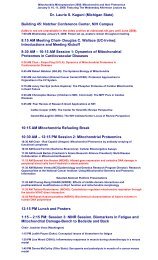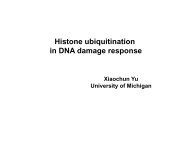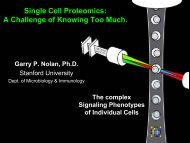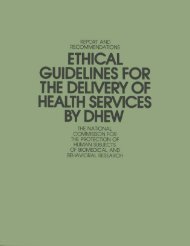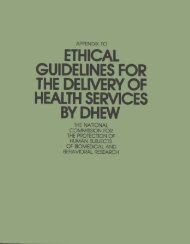RESEARCH ON THE FETUS - National Institutes of Health
RESEARCH ON THE FETUS - National Institutes of Health
RESEARCH ON THE FETUS - National Institutes of Health
Create successful ePaper yourself
Turn your PDF publications into a flip-book with our unique Google optimized e-Paper software.
Dr. Bok concludes that since the means are defensible and the end is desirable,<br />
research on the fetus should be permitted during the first 18 weeks <strong>of</strong> gestational<br />
age and when the fetus is under 300 grams in weight. These limits provide<br />
a margin <strong>of</strong> safety to prevent accidental experimentation on a viable fetus.<br />
Only therapeutic research on a fetus older than 18 weeks or more than 300 grams<br />
in weight should be permitted.<br />
Dr. Bok would permit research on a fetus scheduled for abortion, provided<br />
the mother consents and the research is properly reviewed. She would not prohibit<br />
experimentation which keeps a nonviable fetus alive for a period <strong>of</strong> time<br />
or which hastens its death.<br />
Joseph Fletcher, D.D.<br />
"Rightness and wrongness are judged according to results, not according to<br />
absolute prohibitions or requirements." This statement provides a key to understanding<br />
the position taken by Dr. Fletcher regarding the ethics <strong>of</strong> research on<br />
the fetus. The result which justifies such research is the safety <strong>of</strong> people,<br />
especially children, from genetic and congenital disorders, uterine infections<br />
and a host <strong>of</strong> other maladies.<br />
Dr. Fletcher states that the core question is whether the fetus is a person.<br />
He contends that although the fetus is a potential person, it does not<br />
become an actual person, ethically and legally, until it is born alive and lives<br />
entirely outside the mother's body with an independent cardiovascular system.<br />
Until the fetus becomes an "actual person" it is an "object," a nonpersonal<br />
organism which has value only ins<strong>of</strong>ar as it is wanted by its progenitors. It<br />
is not entitled to protection as a human subject whether viable or not until it<br />
becomes a live-born baby.<br />
Dr. Fletcher states that the following categories <strong>of</strong> research on the fetus<br />
may be justified, depending upon the clinical situation and the design: (1) use<br />
<strong>of</strong> a dead fetus ex utero with or without maternal consent; (2) use <strong>of</strong> a live<br />
fetus ex utero, nonviable or viable, if survival is not wanted and there is<br />
maternal consent; (3) use <strong>of</strong> a live fetus in utero if survival is not wanted<br />
and there is maternal consent; and (4) use <strong>of</strong> a live fetus in utero, even if<br />
survival is intended, if there is no substantial risk to the fetus and if there<br />
is maternal and paternal-spouse consent.<br />
32



